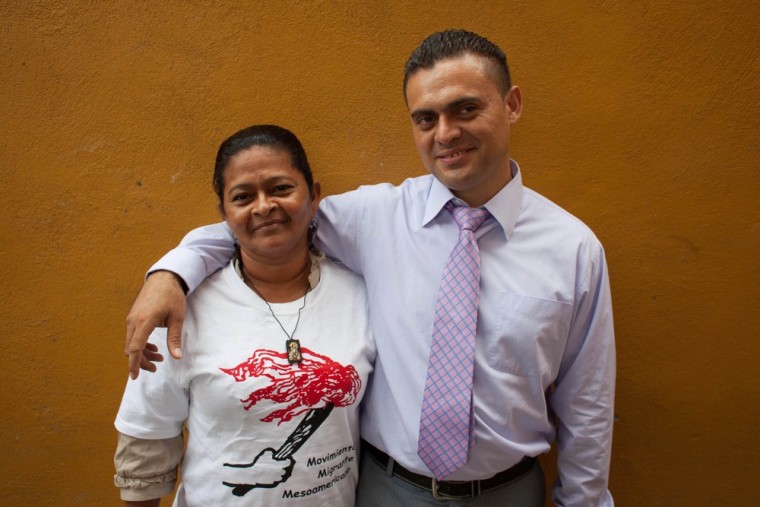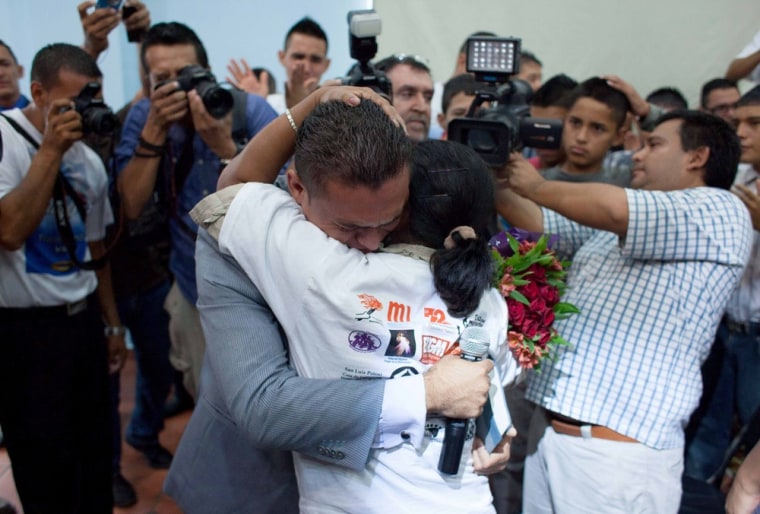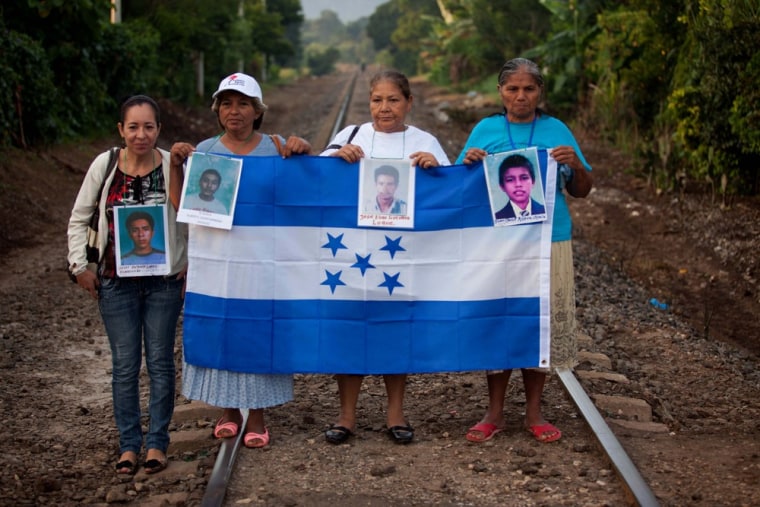Even before the tour bus comes to a stop, the women rise from their seats and wait in the aisle to exit. In their arms rest rolled-up flags of the Central American countries they come from. Large laminated photographs of missing loved ones hang by lanyards from their necks.
They descend the stairs to a gaggle of waiting press photographers. This is their moment of hope, stirring once again the possibility of putting to rest years of uncertainty and desperation.
Maybe someone has seen a missing son or father making his way to the United States in search of work. Maybe someone knows a daughter is OK.
"The goal is to come to look for them," said Virginia Olcot, 42, of Chimaltenango, Guatemala, who last heard from her husband in September 2009 when he arrived at the U.S. border in Sonora. "This is our intention: to not get tired, to persevere and get the government to help us."

It was her third trip with this caravan of women, which for six consecutive years has traveled from Central America to points all over Mexico looking for relatives who have gone missing on their way north. Even if they don't find their loved ones, at the very least they hope to bring attention to the plight of migrants who have disappeared in Mexico.
The group sponsoring the trip estimates that some 70,000 Central American migrants have disappeared in the past six years based on reports from nonprofit groups. Some of them have been found in the most brutal of circumstances: Hundreds of would-be migrants were discovered murdered in the community of San Fernando in the border state of Tamaulipas: first 72, most of them Central Americans, massacred on a farm in 2010, and nearly 200 people, some Mexicans, discovered in clandestine graves about six months later.
Extortion of migrants' families is common since the smuggling business has been taken over by organized crime in recent years. The Zetas cartel in particular is known for holding migrants in houses near the U.S. border and threatening that their loved ones will be killed if their families don't pay more money. Other migrants are believed to have been forced to work for the Zetas or other cartels or were killed if they refused.
This year, 38 women, mostly from Honduras, as well as El Salvador, Guatemala and Nicaragua, will cover 2,800 miles (4,500 kilometers) and 14 Mexican states, traveling from Mexico's border with Guatemala to Reynosa, a major entry point on the Texas border to the United States.
Along the way, they stop at festivals and Catholic Masses and meet with organizations that advocate for human rights and the missing. They visit migrant shelters, show photos of their missing relatives to people who may have seen them and patiently give interviews, recounting the sad details in each new city.
It worked for Olga Marina Hernandez, 52, of Progreso, Honduras, who came last year looking for her 31-year-old son, Gabriel Salmeron Hernandez, whom she hadn't heard from since he left five years earlier.

Salmeron's girlfriend saw the photograph the mother was carrying when it was published in the local press and contacted the caravan's organizers. Within weeks of returning to Honduras, Hernandez received a call from her son, who's a recovering drug addict training to be an evangelical preacher in General Escobedo, a working-class suburb of Monterrey.
"Now I'm happy because now I'm not going to continue thinking about where he is, whether he was killed," she said.
In all, five families will be reunited on this year's caravan, adding to some 100 who have been brought back together during similar trips through Mexico over six years.
Last year, the German nonprofit organization Medico International began funding the caravan, which has allowed it to cover more ground and include a trip to the spot in San Fernando where the migrants' bodies were found. The caravan now has two buses draped with banners carrying full police escorts.
The caravans aim not only to help reunite families but also pressure governments to adjust their immigration policies, said Martha Sanchez Soler, coordinator of the Movimiento Migrante Mesoamericano, which organizes the tours.
"The war against drug trafficking, it hasn't worked and it's turned the migrants into merchandise for the organized crime," Sanchez said. "Actually, what the governments of the United States and Mexico did was to turn over the administration of the migration flows to the organized crime."
Though the mothers were from Central America, the pain of the missing has resonated with Mexicans, many of whom have also been searching for missing loved ones. Later Friday, the mothers met with families from northern Nuevo Leon state.
"We know your pain. We speak the same language," said Irma Leticia Hidalgo, a mother from a Monterrey suburb whose son was kidnapped last year. "Your missing are our missing."
Hidalgo said her 18-year-old son was taken from their home in the middle of the night by about 10 men, half of them wearing police vests from a nearby town, who went on to steal everything of value in the house. Although she paid a ransom and was told she'd have her son back in a few hours, he never returned.
She ultimately retired from her teaching job to look for him.
This year is the second caravan trip for Clementina Murcia Gonzalez, who long dreamed of traveling with her family to Mexico, but the woman from San Pedro Sula, Honduras, had a happier journey in mind.
Murcia, 68, is searching for two sons who disappeared while on their way to the United States to find work. Without the caravan's help, she wouldn't have been able to pay for the trip to Mexico, she said.
Her eldest son, Jorge Orlando Funez Murcia, was 17 when he left home in 1987. Like his father and brother, Funez was a mechanic, but couldn't make a living back home.
His mother tried to investigate his whereabouts as best she could from Honduras, eventually hearing from friends that her son was killed in a rail yard in Guadalajara. "They haven't brought me a body or anything, that's why I decided to look for him," she said.
Fifteen years later, Murcia's younger son, Almagro Orlando Funez Murcia, sneaked away without her permission. He was 23. After five years without a word he called her from southern Mexico to ask for money, which she didn't have.
The next call came from a Mexican man who said her son was at the U.S. border, but he couldn't continue without more money. Murcia asked to speak to her son, but the man said he was bathing. She told the man to have her son call back, but she never heard from him again.
After her son Gabriel Salmeron disappeared, Hernandez also received extortion calls. The last Hernandez had heard from Salmeron he was in Nuevo Laredo, and then nothing. But at one point during the five-year void, she started getting calls from someone who said they had Salmeron in Houston. She sent them $200, but they kept asking for more. They refused to put him on the phone, so she doesn't think they ever had him.
Salmeron said he didn't make it beyond Nuevo Laredo. He lost himself in drugs and wound up in Monterrey, wandering the streets looking for his next fix until he ran into members of an evangelical church that specializes in outreach to addicts. Now he's training to be a pastor.
The church's leader at first opposed the reunion between Hernandez and her son, fearing his promising young preacher would return to Honduras. But by Friday, the church had turned the reunion into a giant event. Members wore "Adictos a Cristo" (Addicted to Christ) T-shirts and inside a high-ceilinged auditorium, Christian rock thundered from a stage complete with a light show and smoke machine.
Salmeron entered with flowers for his mother. They clutched each other in a long embrace surrounded by cameras, before the son, wearing a gray suit and purple tie, launched into a sermon about his journey.
"My mother was in search of a miracle and this miracle became real," he said from the stage. Later, he said it was the happiest day of his life.
Watching the reunion of Hernandez with her son, Murcia and several other mothers wiped away tears.
"I was thinking in that moment that one day it will be my turn," Murcia said later. "It will be my turn to find him, whichever of the two."
More world stories from NBC News:
- Top 10 foreign policy issues facing a new president
- Castro: I'm so healthy I don't 'even remember what a headache is'
- Hate crimes increase, extreme right strengthens as Greece economy sinks
- Report: Several killed in Damascus car bomb ahead of Syria truce talks
- Source: No deal yet on US-Iran nuclear talks
- Video: Dutch art heist a 'significant loss,' museum says
- Kateri Tekakwitha named first Native American saint in Vatican ceremony
- Documents add to evidence of security fears before Benghazi attack
- Newlywed Afghan beheaded for her refusal to become prostitute
Follow World News from NBCNews.com on and
